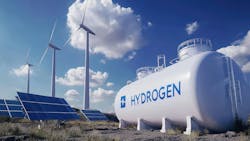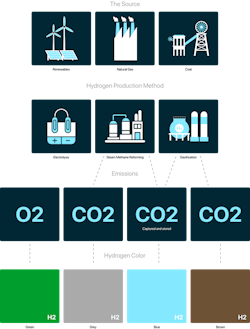Can white hydrogen drive down hydrogen fuel costs?
Hydrogen is still growing as a lower-emissions fuel source in the transportation industry, able to power both fuel cells and internal combustion engines. It's seen as a future zero-emission competitor to battery-electric vehicles (BEVs) due to faster refueling times and closer range parity with diesel trucks. A few OEMs, such as Nikola and Hyundai, have heavy-duty FCEVs on the road already, and Cummins' hydrogen ICE engine is slated for large-scale production in 2028.
The problem is the distribution and production elements have a long way to go before this fuel source is reliably affordable and accessible. There are several ways to produce hydrogen fuel, such as breaking apart water molecules with electrolyzers, and they’re all expensive and energy-intensive. Then there’s the storage, transportation, and dispensing infrastructure as well.
It’s a costly venture.
According to Ole Hoefelmann, president of Nikola Energy, the fueling arm of Nikola Corp., the way the hydrogen ecosystem is today, “anybody who produces hydrogen usually extracts all the value, and whoever dispenses the hydrogen loses all the money to build the market. And that's not sustainable.”
Read also: Insights from Nikola Tre FCEV owner | Fleet Maintenance
According to the California Air Resources Board’s Annual Evaluation of Fuel Cell Electric Vehicle Deployment & Hydrogen Fuel Station Network Development found that the price for a kilogram of hydrogen rose from $14.95 in Q2 2022 to over $20 in Q1 2023.
But recent efforts to drive down cost have led to the depths of the earth and white hydrogen, which occurs naturally underground.
White hydrogen itself can be created in a few ways, whether from radioactive elements in stone that split water into hydrogen and oxygen; or serpentinization, which is when high temperatures underground cause water to react with iron-rich stone to create hydrogen.
PureWave Hydrogen, a company based out of Colorado, is currently using its proprietary, AI-based technology to tap into these natural hydrogen sources in North America. Eventually, this could be a catalyst for driving hydrogen down to a cost that can compete with fossil fuels.
“The cost associated to produce white hydrogen subsurface, depending on the depth and where it is, you're probably looking at 60 cents to $1.20 per kilogram,” explained Bruce Nurse, director of business development for PureWave. “Now compare that to what it costs to manufacture hydrogen using natural gas, oil, or coal; you're looking at anywhere from $8 to $12 per kilogram.”
Geoffrey Ellis, a research geologist for the U.S. Geological Survey, has noted in his research that there’s potentially enough hydrogen from these natural sources to supply the global demand for “thousands of years.”
The problem is finding places where hydrogen has pooled into underground traps like oil or gas; where fractured, iron-rich stones have collected hydrogen; or where iron-rich stones could be encouraged to produce hydrogen by applying water and CO2.
PureWave believes they have found some of these areas rich in white hydrogen.
“There are indications [of hydrogen] from old oil wells,” Nurse said. “Not all of them show this, but there are some indications within those old oil wells that were drilled unsuccessfully, but have recorded hydrogen occurrences. In essence, we're taking old oil and gas methods of exploring for gas and applying innovative technology to help us identify this resource.”
Nurse anticipates that scaling natural, geologic hydrogen production will also help lower costs, particularly with the establishment of more fueling stations cutting down on fuel transportation costs. This is especially true if more hydrogen supply sites reduce the need to liquefy hydrogen for longer transport, which the U.S. Department of Energy reports is a costly process.
“In the end, it's more about the distance to the market,” Nikola’s Hoefelmann stated. “And one of the things that we're trying to advocate for is that we help develop markets near where production is and liquefaction, so we're not driving all over the country.”
Read also: Hyundai's high hopes for hydrogen | Fleet Maintenance
Making hydrogen distribution accessible
Beyond how white hydrogen could provide a more cost-effective source of hydrogen, the transportation industry will also need the proper distribution infrastructure.
“Our ambition is to build hydrogen infrastructure at scale,” Hoefelmann said. “Ultimately, we want to make sure it's also cost competitive, otherwise, you don't have a sustainable business. And we want to build it in a way that people are willing to deploy fuel cell technology at scale.”
Nurse and Hoefelmann agreed that hydrogen pipelines are the best way to achieve this, especially since hydrogen pipes would help avoid the liquefication process entirely.
“If you have something in a gaseous form, the only reason you liquefy it is so you can deliver more at a lower cost, so it's more efficient,” Hoefelmann explained. “But ultimately, liquefying just for distribution is inefficient if you have a pipeline.”
While Hoefelmann noted that there are some hydrogen pipelines along the Gulf Coast, for other regions, there might only be pre-existing natural gas pipes. But hydrogen is too corrosive for natural gas piping, Nurse explained, so that would still require some engineering to make hydrogen accessible.
Additionally, Hoefelmann noted that not only would hydrogen delivery pipelines need to be established to make this fuel source viable, but fuel stations would need to be more efficient so as to avoid fuel losses.
“Today, a liquid station uses what's called a liquid pump,” the Nikola Energy president said. “That pump, depending on who you talk to, has losses that need to be worked out of the system.”
Hydrogen into the future
Despite these complications, Nurse is confident in the positive impact white hydrogen could have, especially for commercial vehicles.
“If we are successful in finding hydrogen as an energy source, I think it's going to be a game changer within the energy industry,” Nurse emphasized. “Hopefully hydrogen will surpass the EV space, especially in the auto industry.”
Hoefelmann noted that hydrogen’s efficacy as a fuel source makes it a particularly strong contender in the race between fuel cell electric vehicles (FCEVs) and BEVs, explaining that Nikola has had customers that have transitioned from the latter to the former due to range, charging difficulties, and infrastructure difficulties.
“I do believe that long-term, there'll be use cases for both,” he said. “But I think when you're looking at a workhorse and looking at increased efficiency, I do believe that the fuel cell will win out.”
About the Author

Alex Keenan
Alex Keenan is an Associate Editor for Fleet Maintenance magazine. She has written on a variety of topics for the past several years and recently joined the transportation industry, reviewing content covering technician challenges and breaking industry news. She holds a bachelor's degree in English from Colorado State University in Fort Collins, Colorado.

